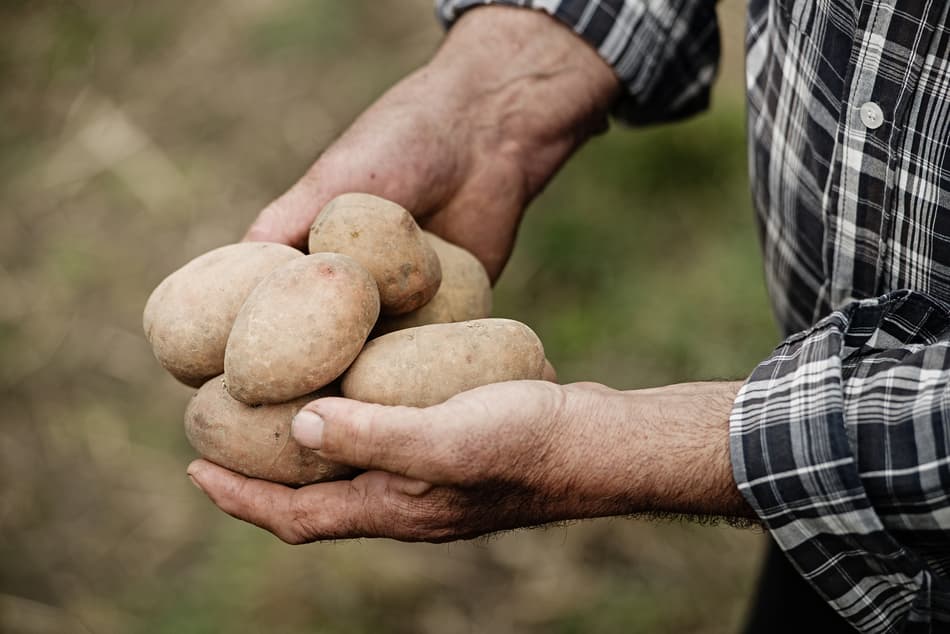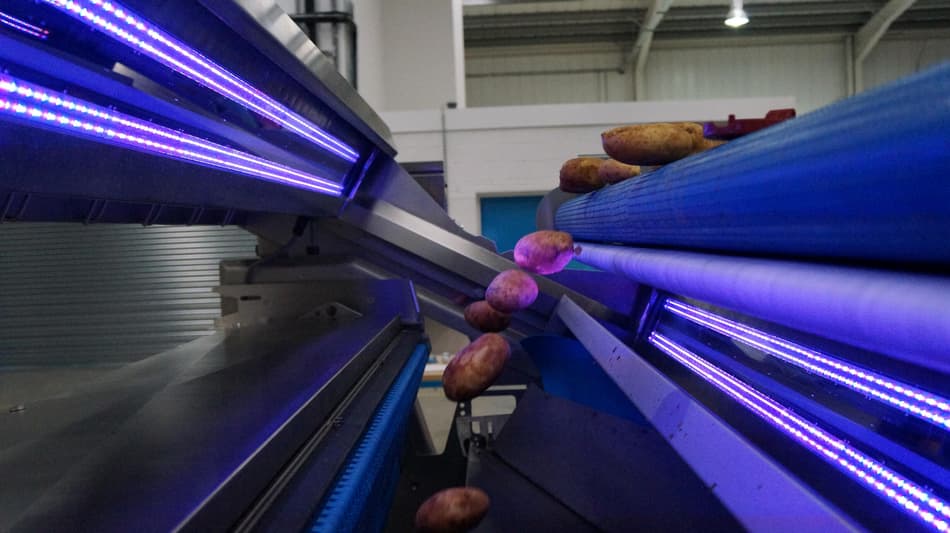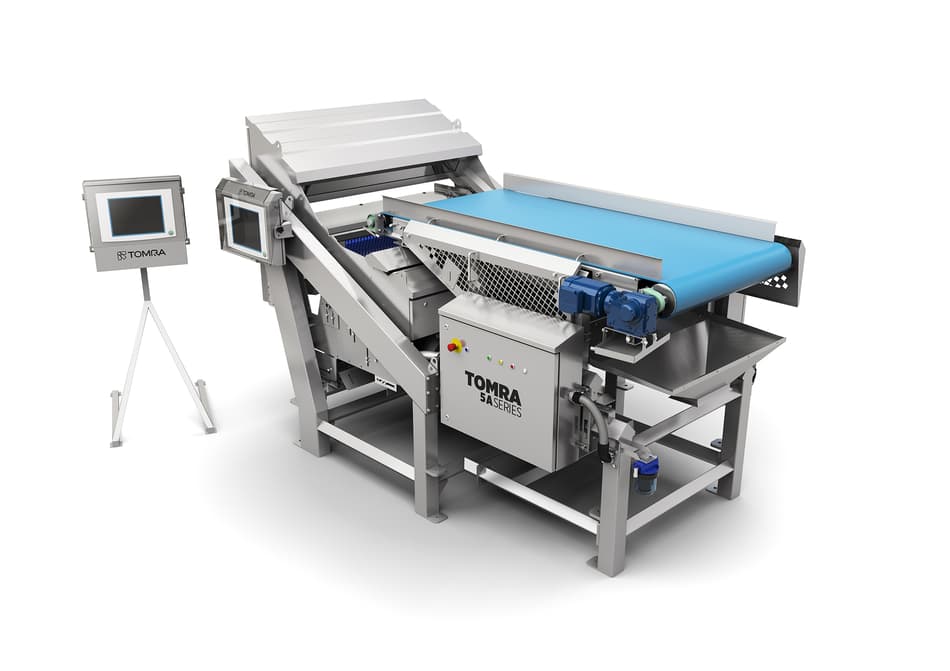Get in touch
Our automation works smarter, wastes less, and optimizes your lines to ensure quality is consistent and potential recalls are a thing of the past.
Speak with us to learn how you can make Every Resource Count!™
Running a potato fresh pack line involves keeping an eye on so many variables that it can seem like juggling – and now, because of COVID-19, there are more balls to keep in the air. Performing the seemingly impossible can become possible, however, when TOMRA Food provides a helping hand. TOMRA’s optical sorting machines, well known for sorting to high levels of accuracy with low levels of waste, also solve a wide range of pack line challenges which have intensified since the emergence of COVID-19.
Since consumers have been doing more home-cooking, sales of fresh potatoes have seen sustained rises of 30-40%. But in the efforts to keep up with demand, there are limits to how quickly a packing line can run when manual laborers are involved in sorting. Limits, also, to how long manual sorters can fully concentrate on the task. Sorting machines, however, can run at full capacity around the clock without tiring or losing their focus. The TOMRA 5A optical sorting machine removes more than 98% of unwanted materials from the line while running the highest capacity in the industry.

Longstanding difficulties finding manual workers have worsened because of COVID-related travel restrictions and highly-publicized outbreaks of the disease at food processing plants. But machines can greatly reduce or eliminate dependency on manual labor for sorting tasks, allowing employers to re-locate people to other packhouse areas where social distancing is easier and workers can do more to help improve productivity.
One of many companies that has especially appreciated this machine-advantage since the advent of the pandemic is Gumz Farms, a grower and packer in Wisconsin, USA. Business owner Rod Gumz says: “Fortunately, our TOMRA sorter has allowed us to reduce the number of people needed to sort our potatoes, provide safe social distancing for our employees, and increase output to meet the demand.”
Another good example of this machine-advantage was seen in May this year when Ortofrutticola Parma in Italy invested in a new sorter for its potato line. The company’s sales manager, Ivan Parma, reports: “The sorting efficiency made it possible for us to free staff from the sorting area to work in other areas, increasing productivity.”
The ability to adjust a potato packing line speedily from one product specification to another is valuable because it minimizes downtime – and has become even more important in recent months because retailers have frequently switched the varieties of potatoes they’re packaging as special offers. A packer might be asked on a Friday afternoon to source and supply a certain variety of potato, to a precisely defined size, shape and standard, free of visual blemishes, in bags of an exact weight, by early the following week. That’s a big ask – but the TOMRA 5A can help packers meet these requirements with great accuracy and minimal downtime.

Productivity and the maximization of throughputs are particularly desirable now that there’s strong demand for fresh potatoes. And as Olivier Vandaele, CEO of Flandre Pomme de Terre in France, found after investing in a TOMRA sorter, such technology can “completely revolutionize working practices.” When this family-run grower/packer set the ambitious objective of increasing volumes by 30%, says Olivier, the business found that having a sorter was “the best way of ensuring a constant hourly sorting throughput while minimizing the organizational impact, to increase throughput during the season and achieve the desired growth.”
Productivity also means improving profitability by minimizing waste. This is something the TOMRA 5A does well by recuperating lesser-quality potatoes for sale as a lower grade product. The TOMRA 5A additionally improves productivity by reducing or eliminating the need to slow down the line to allow the product to be inspected manually, and by minimizing the level of false rejects to achieve higher yields.
Under pressure to meet the increased demand for potatoes, packers might be tempted to send greater quantities down the line or run the line at higher speeds. But this makes it more difficult to control quality, which is essential for ensuring food safety for consumers, protecting the reputations of manufacturers, and keeping packers’ customers satisfied.
Profitability can also be affected by the packer’s ability to precisely determine the quality of the potatoes that are allowed to reach the end of the line for bagging. A high-quality product can be the key to higher-value markets, while there’s also a worthwhile amount of money to be unlocked from making otherwise unsaleable potatoes saleable at lower grades. This can only be achieved with an accurate optical sorting machine. As Olivier Vandaele of Flandre Pomme de Terre confirms: “With each batch that arrives for sorting, we just have to check the machine settings to take into account differences in the product criteria set by our customers. The batches of products obtained with the TOMRA optical sorter have very homogeneous characteristics.”

And optical sorting machines deliver a nice bonus to supplement the consistent product quality, as Sergio Pinho, manager of the Portuguese family firm Oliveira Pinho & Filhos – which specializes in bagged potatoes and onions – explains: “TOMRA’s machine allowed us to increase the final quality of the goods with less labor. Our customers are more satisfied and the process in our factory has significantly improved.”
Some packers prefer their suppliers to take care of the potatoes’ initial clean-up. For this ‘pre-sorting’, packers should recommend to their suppliers the TOMRA 3A optical sorting machine. The TOMRA 3A is ideal for detecting and removing foreign materials commonly found in loads of freshly picked potatoes, such as field mice, plastic bottles, stones, wood, sticks, stalks and vines.
At the packhouse itself, some bigger businesses would like to go beyond reducing the number of manual sorters they employ, and completely eliminate the need for human intervention. This can be achieved by complementing TOMRA Food’s sorting machines with a Multi-Lane Sorter (MLS) from Compac, part of the TOMRA Food family. Renowned for gentle product-handling while maintaining throughput, Compac’s industry-leading MLS system accurately sorts and grades vegetables (and fruit) according to weight, size, shape, color, surface blemishes and internal quality.
